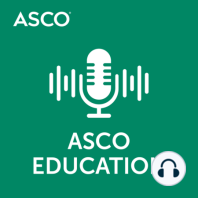5 min listen
Oncology, Etc. – Mr. Paul Goldberg: Interviewing the Interviewer (Part 2)
FromASCO Education
ratings:
Length:
23 minutes
Released:
Apr 19, 2022
Format:
Podcast episode
Description
Drs. David Johnson (University of Texas) and Patrick Loehrer (Indiana University) host the second half second half of their Oncology, Etc. interview with Mr. Paul Goldberg, the editor and publisher of the world-renowned publication The Cancer Letter. In part two, Mr. Goldberg talks about literary works he has developed outside of The Cancer Letter, his perspective on the Russian/Ukrainian conflict, and more. If you liked this episode, please subscribe. Learn more at https://education.asco.org, or email us at education@asco.org. TRANSCRIPT Dr. Pat Loehrer: Hi, I'm Pat Loehrer, Director of Global oncology and Health Equity at Indiana University. I'm here with David Johnson, a medical oncologist at the University of Texas Southwestern in Dallas, Texas. This is the second half of our two-part Oncology, Etc. A conversation featuring Paul Goldberg, who's the editor of the prestigious oncology publication, The Cancer Letter. While, part one focuses more closely on Mr. Goldberg's early life - his introduction to writing and ecology and his work with The Cancer Letter - in part two, we're going to learn more about the literary works of Mr. Goldberg which are developed outside of The Cancer Letter. We'll also learn about his insight into the Russian Ukrainian conflict. We'll pick the conversation back up with Dave asking Paul about the most important changes he's seen in oncology throughout his career. Dr. David Johnson: What changes in oncology have you seen that have been most impressive in your mind, apart from therapeutic advances? What other changes have taken place that you've witnessed in your role as editor of Cancer Letter that you think really made a difference? Paul Goldberg: I think there's a lot less of this kind of, I have more friends now than I've ever had before, maybe I'm just getting old and I like a lot of people. There were a lot of people that I did not like early on. For me, culturally that's a difference. I think a lot of people are thinking along the same lines. There's a language of oncology. There's an understanding of the importance of clinical trials. People are arguing about whether to randomize. It wasn't that long ago that people were wondering about whether that's even a good thing. You mentioned Rick Pazdur. I don't know if it rises to the level of being able to say that I coined the term but the language of oncology, to some extent, is Pazdur-esque because he has gotten everybody on the same wavelength, and people do understand what it takes to get a drug to develop most of the time. So, that would be my first observation. There’s less to argue about the fundamentals. And also, a lot of the kids I came up with are now cancer center directors. Dr. Pat Loehrer: In one of the friendships, I think it's been really strong has been you and Otis Brawley was crucial. You guys wrote a book together. And I think part of that book, which was very interesting was the title says, First do no harm. There are a lot of things we do in medicine that we think we're doing well, but yet, by over-testing and overtreatment, we actually don't, in the long run, help the patients or help society. Tell me a little bit about that. You're not working on this project without us on the history of oncology. And so, the perspective of that and what are some of the most interesting historical stories that you know about? Paul Goldberg: I think he just at one point at one of the NCI meetings might have had something to do with NSABP, he started explaining to me, the NIH Reauthorization Act of 1993, and how women and minorities’ language was bizarre in there, and the definition of minorities and definition of race. So, here's this guy who is explaining stuff to me, which I wouldn't have really slowed down to think about because journalists generally don't slow down to think about things unless you tell them to, at least I didn't at the time. And then I said, well, this guy has been explaining stuff to me and I've been explaining stuff
Released:
Apr 19, 2022
Format:
Podcast episode
Titles in the series (100)
ASCO Guidelines: Pancreatic Cancer: ASCO Guidelines: Pancreatic Cancer by ASCO Education
